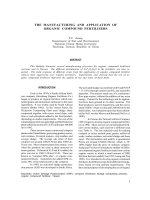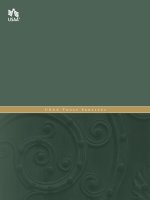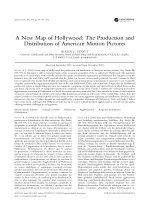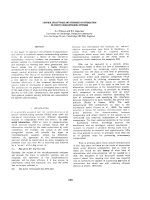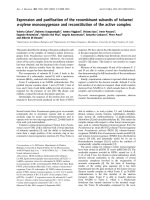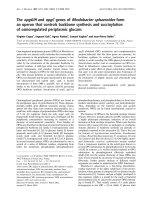USAA Trust Services - Protect your future and that of your loved ones pot
Bạn đang xem bản rút gọn của tài liệu. Xem và tải ngay bản đầy đủ của tài liệu tại đây (6.53 MB, 10 trang )
U S A A T r u s t S e r v i c e s
Protect your future and that of your loved ones
You have worked a lifetime to accumulate your assets. Now you need to protect those
assets and ensure they keep their value. Managing your wealth takes careful coordination
of financial management and legal planning to protect assets from the costs that can erode
their value and delay the efficient distribution of assets to your heirs. Estate settlement costs,
taxes, legal fees, privacy issues and other considerations need to be taken into account when
you consider how to manage your wealth today and for the future. Carefully coordinated
trust and financial planning services are a vital part of that plan.
USAA Trust Services
1
Security. Stability. Protection.
2
What is a trust?
A trust is a flexible financial planning tool that holds the assets of an individual (the settlor
or grantor) for the benefit of one or more beneficiaries. The grantor names a trustee, and
possibly a co-trustee, to manage the trust during the grantor’s lifetime and distribute, at
death, the trust’s assets according to the grantor’s wishes. Often, an institution that provides
professional trust management services is chosen as either a trustee or co-trustee.
Why have a trust?
Trusts are not only an estate-planning tool for the very wealthiest people. A trust can benefit
people with even modest assets as a part of a financial management strategy. As part of a
comprehensive financial management plan, a trust can be tailored to protect your assets and
give you greater financial peace of mind. Trusts can help you:
• Maintaincontinuityofassetmanagementintheevent
ofincapacitationordeath
• Provideforyourfamily’sfinancialneedsafteryourdeath
• Ensureprivacyforyourestate
• Eliminateprobatefeesonassetsheldinlivingtrust
• Reduceoreliminateestatetaxes
• Expeditethedistributionofassetstobeneficiaries
• Providebettercontroloverassetdistributiontobeneficiaries
withspecialneedseitherduringtheparent’slifetime
oraftertheirdemise
Customized to Fit Your Needs
3
Who should consider a trust
as part of their financial planning strategy?
You may benefit from a trust if:
• Youwishtoleaveyourestatetoyourspouseandstillmakebequeststoother
beneficiariesafteryourspouse’sdeath
• Youwanttoprovideforyourcurrentspouse,aswellasanychildrenfroma
previousmarriage
• Youareconcernedaboutthepossibilityofperiodsofdisabilityandyouwant
toensurecontinuousmanagementandprotectionofyourassets
• Youwantincreasedcontrolovertheactualdistributionofyourassetsafter
death,especiallyinprovidingforbeneficiarieswith“special”needs,suchas
disabledpersonsorbeneficiariesunabletomanagetheirinheritance
• You’remarriedandyourassetsexceedthemaximumapplicableexclusion
amountforfederalestatetaxes.
Personal trusts
Trusts can protect you and your beneficiaries from many of the costs, difficulties and delays
associated with estate settlement. You may use a trust to determine how your assets will be
used and/or distributed to your heirs and to ensure your estate is managed according to your
wishes in case of incapacity or death.
Two commonly used types of personal trusts are the Living Trust and the Testamentary
Trust. A Living Trust goes into effect during your lifetime, while a Testamentary Trust is part
of your Will and goes into effect at your death.
Living trusts
A Revocable Living Trust may generally be amended or terminated by the grantor at any
time. At your death it can provide for distributions of assets to your beneficiaries while
avoiding probate. It can minimize estate settlement-related fees and taxes and is most widely
used for asset management continuation in the event of death, incompetence, or disability.
It is also a favorite of those who own real estate in multiple states because it is “probate-
friendly.” However, because the property remains in your control, it is subject to estate
taxes. There are provisions that can help minimize these estate taxes if you meet certain
stipulations.
An Irrevocable Living Trust provides a similar ability to avoid probate as a Revocable
Trust, plus has the potential for additional estate tax savings. It also may offer certain credit
protection for beneficiaries. Once property is transferred to this trust, future appreciation of
that property is not generally included as part of your estate assets. Essentially, the terms of
an irrevocable trust cannot be altered.
Testamentary trusts
A Testamentary Trust goes into effect at your death. The provisions of the trust are
incorporated in your Will and becomes effective when your Will has undergone the probate
procedure. This trust is frequently used when a person does not want to change asset
registration or otherwise fund a trust during his or her lifetime, but realizes the need to
provide for distribution of assests after death. A testamentary trust can help you control asset
distribution at your death or continue management and distribution of assets for a period of
time after your death.
4
Types of Trusts
5
Bypass trust or credit shelter trust
This trust can reduce or eliminate federal estate taxes by maximizing the unlimited marital
deduction and Unified Estate and Gift Tax Credit to “bypass” your spouse’s estate, while still
allowing your spouse to receive income from the trust.
Irrevocable life insurance trusts
An irrevocable life insurance trust can be used to buy and hold insurance policies and
keep proceeds from those policies out of your taxable estate, subject to certain “look-back”
periods.
Generation-skipping trusts
These trusts transfer property to second-generation beneficiaries (usually grandchildren),
without the proceeds from the trust actually becoming a part of the children’s estates.
Charitable annuity trust or unitrust
This trust enables you to donate to an irrevocable trust and retain the income during your
lifetime. After the death of the income beneficiary the assets will be transferred to your
designated charity. Gifts to charitable trusts receive an income tax deduction and avoid
estate taxes.
Other Types of Trusts
6
What is probate?
Probate is the legal process of “proving” a Will, which includes, among other things, 1) a
court determining that a Will is valid, 2) paying any debts from the deceased’s estate, and
3) distributing assets in accordance with the terms of the Will. Probate assets are subject to
probate costs, state and federal estate taxes and, in some states, inheritance taxes. The cost
of probate will vary from state to state and is based on state law. Costs can include legal and
executor fees, court costs, and appraiser fees.
How can a trust help with the probate process?
By establishing a trust, those trust assets are generally not subject to public scrutiny and
enables the trustee to begin distributing assets according to your wishes, without going
through probate. Probating a Will can be costly and lengthy – often six months or more in
some states – and is a public process available to anyone who is interested in the details of
your estate.
What can a trust do that a Will can’t?
In addition to reducing probate costs and expediting estate settlement, living trusts or
testamentary trusts can provide additional estate tax advantages, as well as asset control.
They are particularly useful if you have significant assets and want to provide for your
grandchildren, minor children or other beneficiaries who are unable to manage assets on
their own.
What might the tax advantages be for using a trust?
Federal estate taxes have marginal tax brackets. There is also the possibility of state-imposed
inheritance taxes. If you plan ahead using a trust, in many instances you can greatly reduce
or even eliminate these taxes.
Trust Questions and Answers
7
How do I know if a trust is right for me?
It depends on your personal goals for the trust. The most common reasons for setting
up a trust are: avoiding probate, estate tax relief, greater asset control, providing for your
beneficiaries after your death, ensuring assets are distributed according to your wishes,
continuity of asset management in the event you become disabled, and privacy.
How do I decide what sort of trust to use?
There are many different types of trusts and many factors that need to be considered in
deciding which one is right for you, including beneficiaries, trust asset amount, estate tax
reduction, asset distribution, and the amount of control you want. You and your attorney
with your financial advisor should work together to determine which trust is best for you.
8
USAA Trust Services is Here For You
Choosing the right trustee
One of the most important aspects of
creating a trust is selecting the right trustee.
A trustee is responsible for ensuring that your
investments, assets and financial affairs are
handled in accordance with your wishes. A
trustee also has fiduciary responsibilities to a
trust’s beneficiaries for both asset protection
and management, and must keep extensive
financial records of all financial activities
related to the trust. A corporate trustee can
assist with the management of your trust
during your lifetime and at death.
You can trust USAA
Trusts can be complicated and time-consuming to administer, therefore, many turn to an
institution with professional trust administrators as their trustee. As your trustee, USAA Federal
Savings Bank will provide you with investment, tax and trust administration experience, plus a
centralized administrative, and investment team to meet your trust’s needs. We will help you
prepare to meet with your attorney by discussing with you the various trusts, Wills and durable
powers of attorney that might be useful for your particular financial situation. Using USAA as
your trustee ensures continuity of service.
Get started with USAA today
You have worked too hard for yourself and your family to take your assets for granted or
entrust them to anyone who might not be able to manage them effectively. With USAA Trust
Services, you have a team of investment and trust administration professionals who can ensure
your trust is properly managed and implemented according to your wishes.
Although it is difficult to think about providing for your family after your death, setting up a
trust could be one of the most generous and caring things you will ever do for them.
Call today to discuss how trusts can benefit your estate plan and how USAA Federal
Savings Bank can serve as your trustee and assist you in managing the assets in your
trust. You can reach us toll free at (877) 899-6325.
The preceding discussion is not tax, legal or estate planning advice. Consult with your tax,
legal or estate planning professional regarding your specific situation.
Fiduciary Responsibilities
of a Trustee
• Loyalty
• MakingAssetsProductive
• AvoidingUndueRisk
• MaintainingAccurateRecords
• CommunicatingwithBeneficiaries
• AvoidingConflictsofInterest
USAA Trust Services offered by USAA Federal Savings Bank, Member FDIC.
55253-0310 FPS-2008-443 © 2010 USAA.


